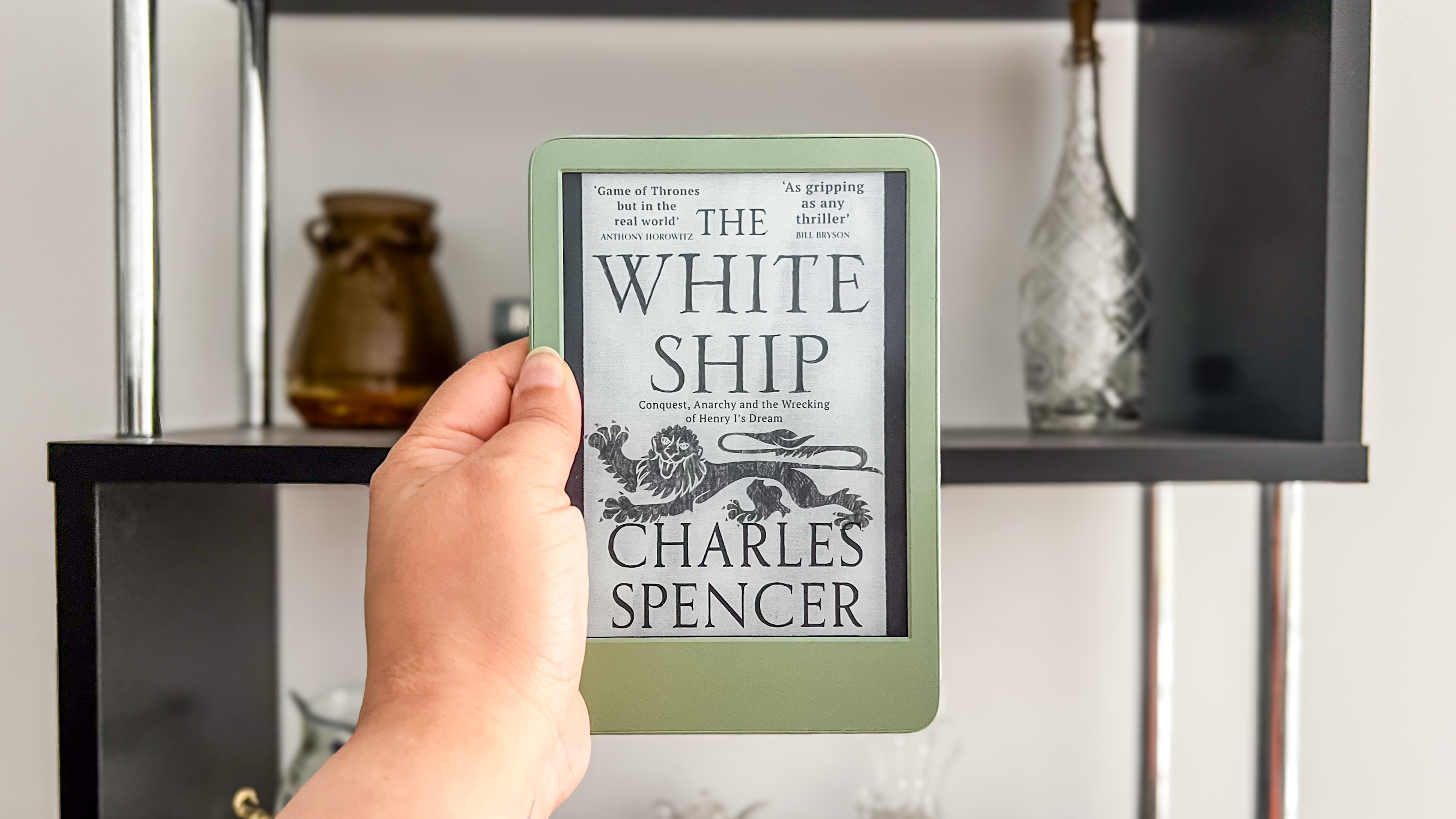
Amazon Kindle (2024): One-minute review
I was initially a little surprised that Amazon is calling the 2024 Kindle the “11th generation”, which was what the 2022 model was designated as. Delving deeper into the specs of the new entry-level Kindle – a lot of which Amazon hasn't actually revealed – and after spending some time with it, I can see why it's more a 2022 Kindle version 2.0.
I love the new Matcha Green color, though. It looks so much brighter than last year’s Denim Blue, but after years of seeing only black ereaders, any deviation from that is a breath of fresh air. I wish the rear plastic panel had some texture. It’s so smooth that I feel insecure when using it on public transport – a case to add some grip is definitely called for.
While Amazon isn't revealing what screen technology has been used here, a side-by-side comparison with the new 2024 Kindle Paperwhite and the Kobo Clara BW tells me it's still using the E Ink Carta 1200 display from the previous 2022 Kindle. That's not a bad thing, but it means you can get more contrast – and thus darker and sharper text – on other models that use the E Ink Carta 1300 screen. And the Kobo Clara BW, which does, isn't much more expensive than the 2024 Kindle.
The only thing different about the screen is the maximum brightness it's capable of and that’s likely not because of upgraded technology, but rather the addition of an extra LED. This improvement, to me, isn’t particularly a big deal as it will be the rare reader who needs the display set to maximum brightness. I, personally, found it hurt my eyes at full bore if there wasn't much ambient light around.
Like the previous model, there’s still no waterproofing and there’s still just 16GB of storage on board. While that’s plenty for hundreds of ebooks and some audiobooks, only 11.5GB of that is available for use as, I think, Amazon has done something with the operating system that's using approximately 2GB more than on the 2022 edition.
I can’t tell what the changes with the OS are exactly, as the interface is still quintessentially Kindle with no new features, but it's possible that these are performance changes. In testing, I found the 2024 Kindle to be a touch faster and more responsive than the previous generation, with no ghosting whatsoever. That said, it could also be because Amazon may be using a new processor, but that's another spec the company isn't revealing.
All said and done, the 2024 Kindle, to me, is just matcha ado about nothing (sorry, I just had to let that one out) as it truly is just version 2.0 of the previous model and I'm struggling to justify the price increase over the 2022 Kindle.
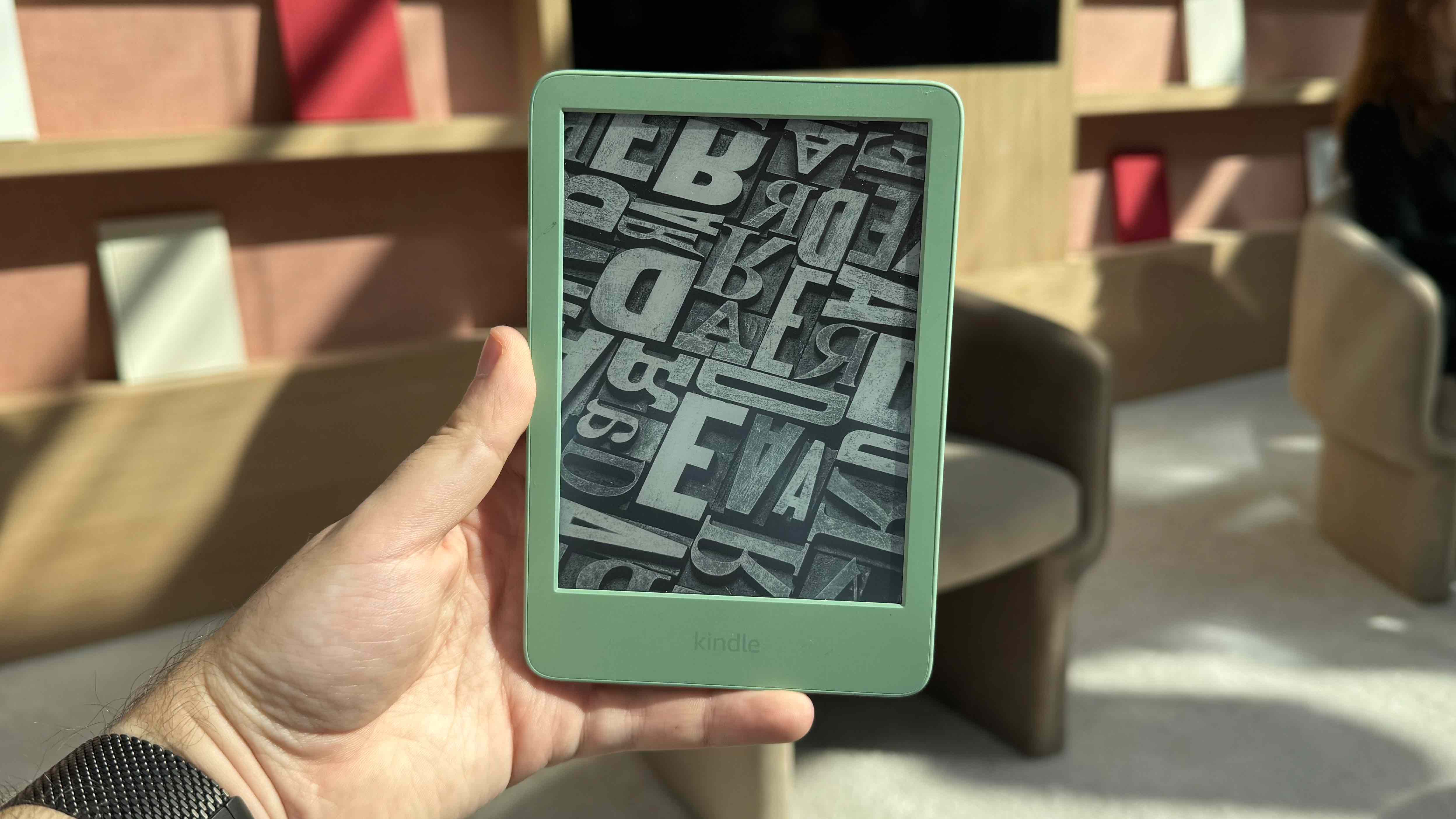
Amazon Kindle (2024) review: Price & availability
- Priced higher than the 2022 Kindle
- Listed at $109.99 / £94.99 with ads, or $129.99 / £104.99 / AU$199 without ads
- Available now directly from Amazon and some third-party stores
The 2024 Kindle might come in a lovely new color but it’s essentially still the same 11th generation model that was released in 2022, which is why I’m disappointed that Amazon saw fit to increase the price of its entry-level Kindle.
The 2024 release now costs $109.99 / £94.99 with ads or $129.99 / £104.99 / AU$199 without (note that, in Australia, only the ad-free version is available). In comparison, the 2022 edition cost $119.99 / £94.99 / AU$179 for the non-ads model before it was discontinued.
Another point of comparison could be the Kobo Clara BW, which is the same size, offers the same amount of onboard storage, but has an updated screen and IPX8 waterproofing too. It will set you back $129.99 / £119.99 / AU$239.95. That’s the same price as the 2024 Kindle in the US, but more expensive in the UK and Australia, although I'd argue that it easily justifies the higher cost.
The good news is that Amazon will always discount its Kindles during major sales in your location, which is when I think it might be worth considering the 2024 Kindle over the Kobo Clara BW.
There are two colors of the 2024 Kindle to choose from – a lovely Matcha Green and the usual Black – and both cost the same. I would recommend getting a case for the Kindle as it’s not very grippy, so be prepared to spend a little bit more – you can always pick up a third-party option which would be cheaper than buying an Amazon-made one.
• Value score: 3.5 / 5
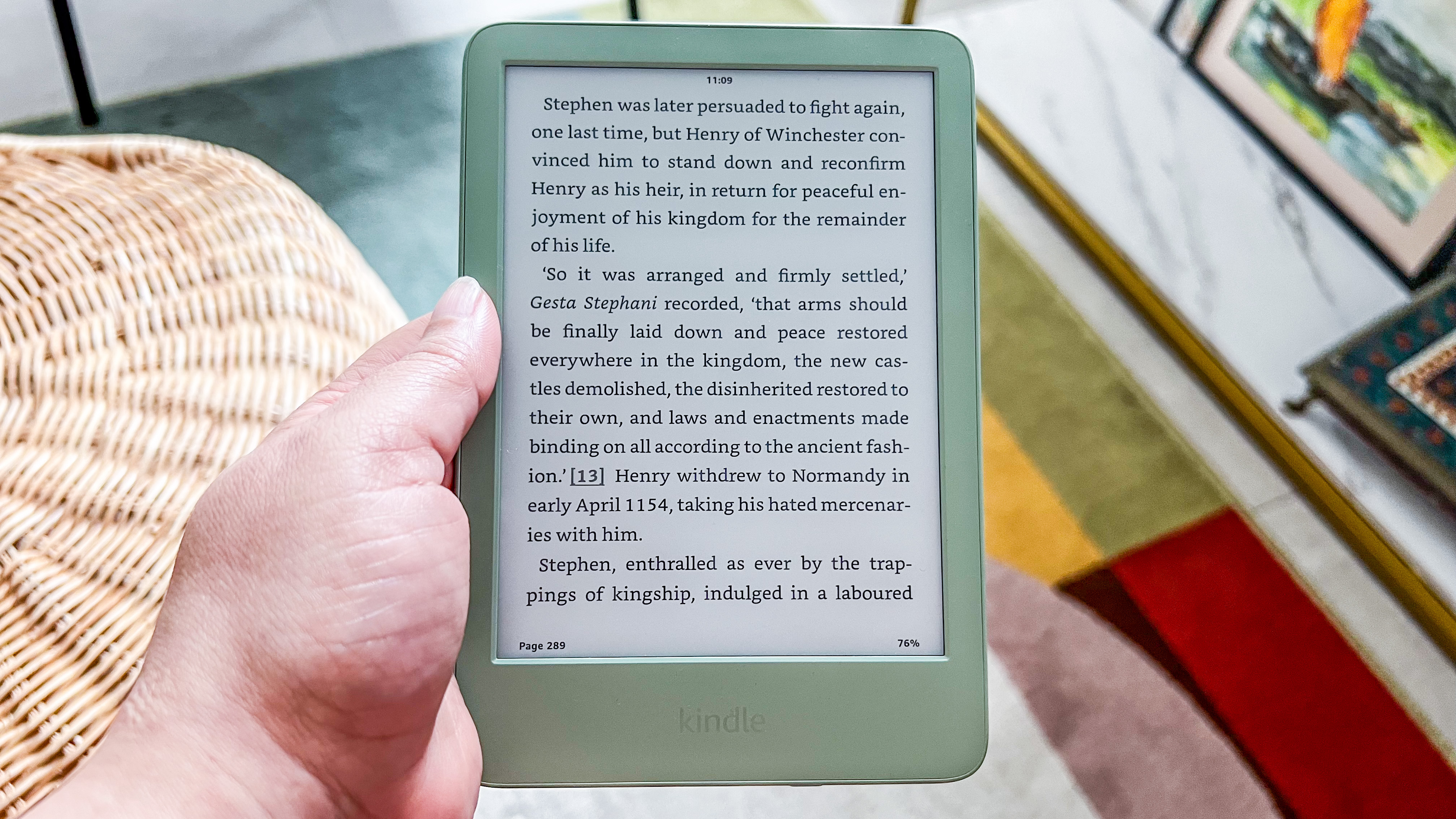
Amazon Kindle (2024) review: specs
Amazon hasn’t disclosed a bunch of the usual specs for the 2024 Kindle, like which specific E Ink screen is being used here, the processor under the hood or the battery capacity. I’ve listed the official specs that Amazon has chosen to release, but have also added my thoughts in parentheses where necessary.
Amazon Kindle (2024) review: Design & display
- Match Green in a lovely, bright color
- 6-inch display makes for a very compact and lightweight ereader
- Lacks any kind of grip
I suppose it’s fair to say that ereader design, particularly the entry-level ones, are getting very dated, but Amazon has countered that by offering a brand-new color for the 2024 release of the basic Kindle. The Matcha Green is a breath of fresh air – it looks bright and beautiful, more so than the Denim Blue from 2022, and makes quite the statement. There is the usual black version too if you prefer, but why would you when you can have something different for the same price? Another reason to opt for the green model is that oily fingerprints and smudges aren’t as visible as they would be on a darker version.
Other than that, not much else has changed physically on the Kindle, including the rear plastic panel that is smooth and makes me feel rather insecure when I’m using it during my daily commute. A case could solve the lack of grip easily enough, but that’s an additional cost you will need to bear.
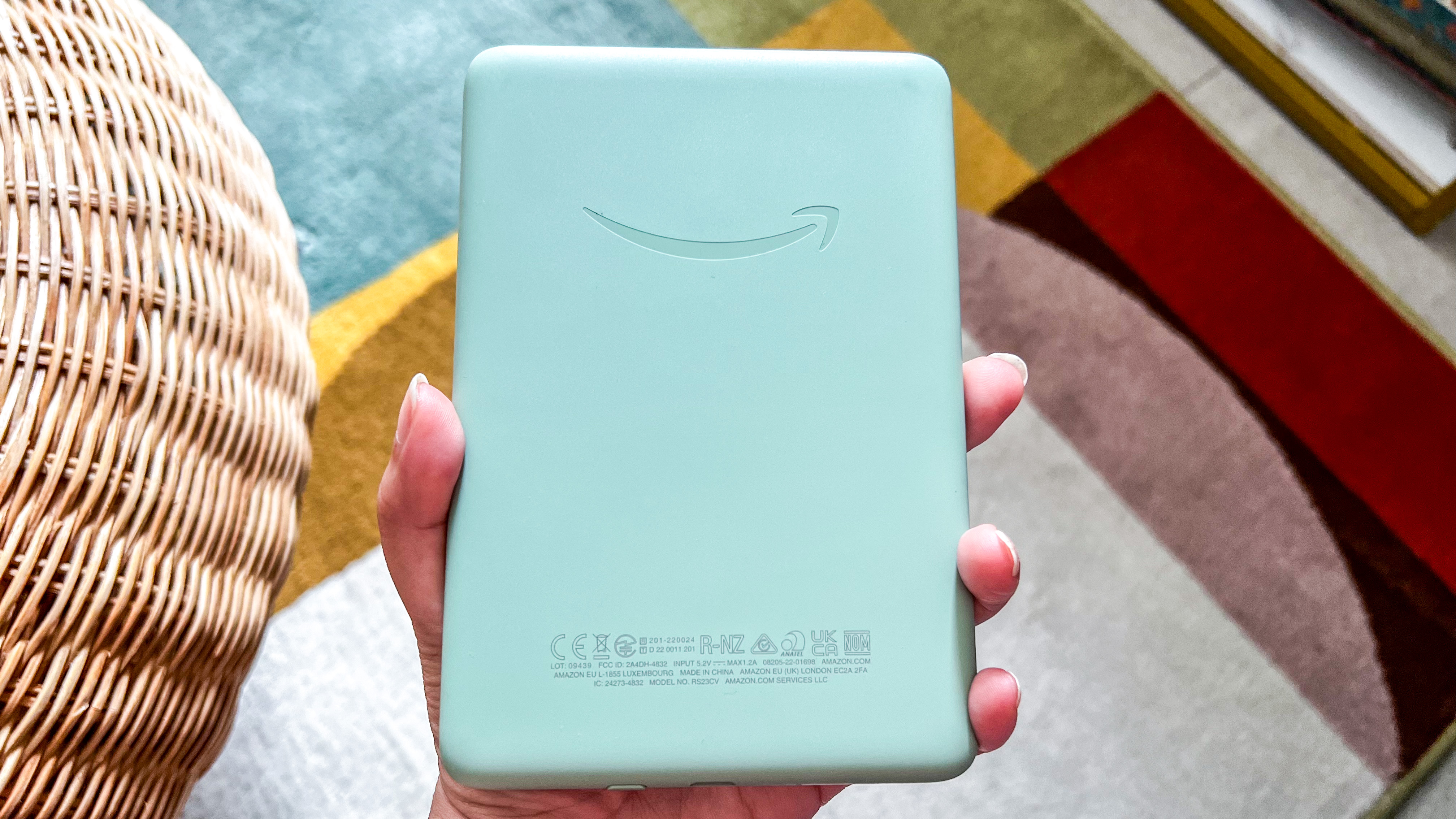
As lovely as the 2024 Kindle looks (in green, specifically), I’m a little concerned about its longevity based on what I’m seeing on the 2022 edition. Two years on, the older model’s plastic chassis is cracking, with hairline breaks clearly visible along both curved edges.This is despite the fact that the 2022 Kindle has always been in a case since it was sent to me for testing and I can’t remember ever dropping it. I’m not saying this will happen to the 2024 version, but it would be remiss of me to not mention it.
I will admit that I’m not a huge fan of a 6-inch ereader – I find the screen too small, personally and prefer a 7-inch display – but there’s no denying that, at just 158g, the Kindle is very compact and portable. It would easily slip into a large pocket of a jacket or any bag for that matter, but you might want to keep it away from water. The entry-level Kindle still lacks waterproofing, which is a shame as Kobo’s counterpart is IPX8 rated and won’t cost you too much more. In fact, the Kobo might offer more value for money considering it also boasts the latest E Ink monochrome screen (Carta 1300) that the new Kindle seemingly misses out on.
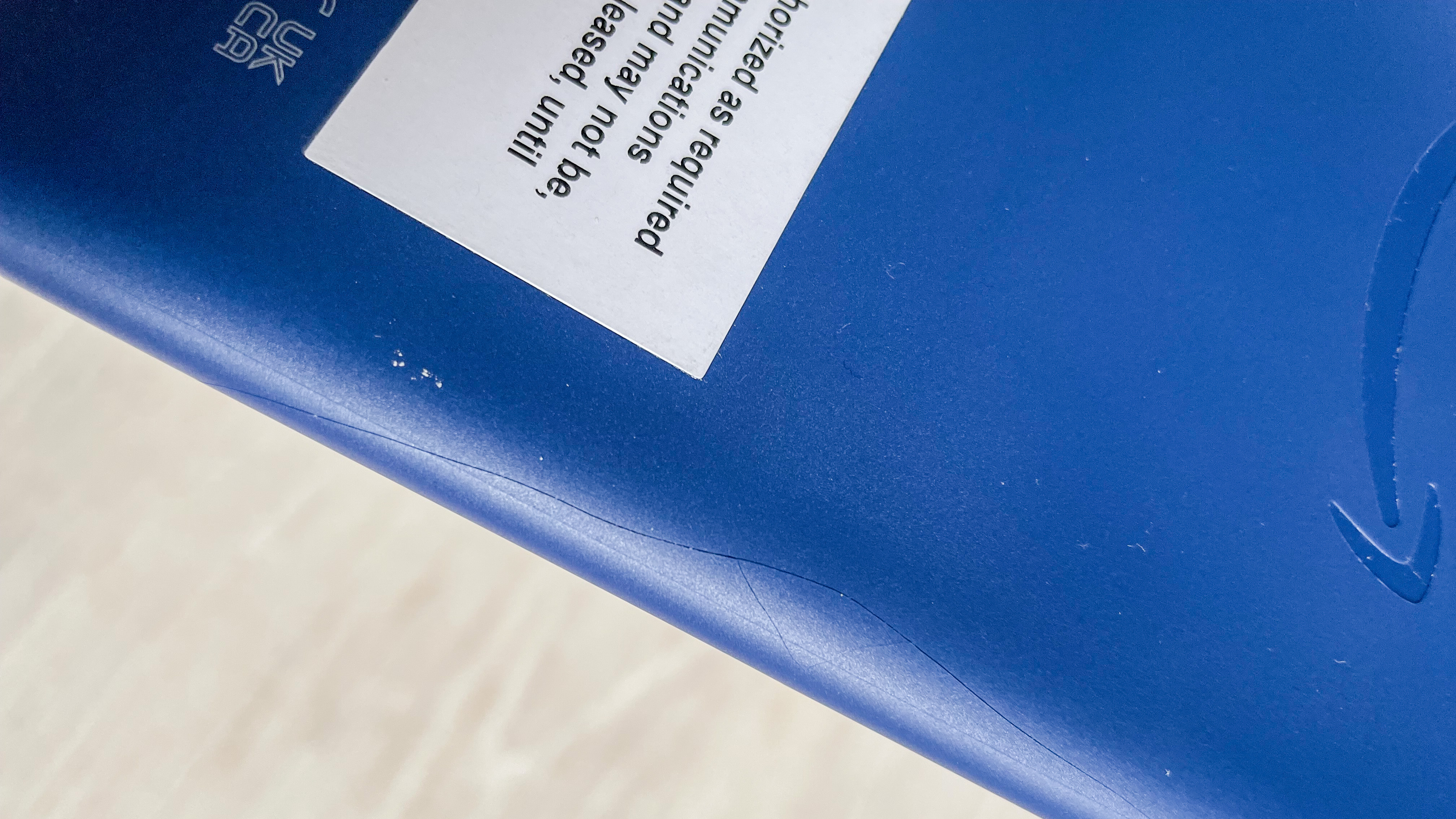
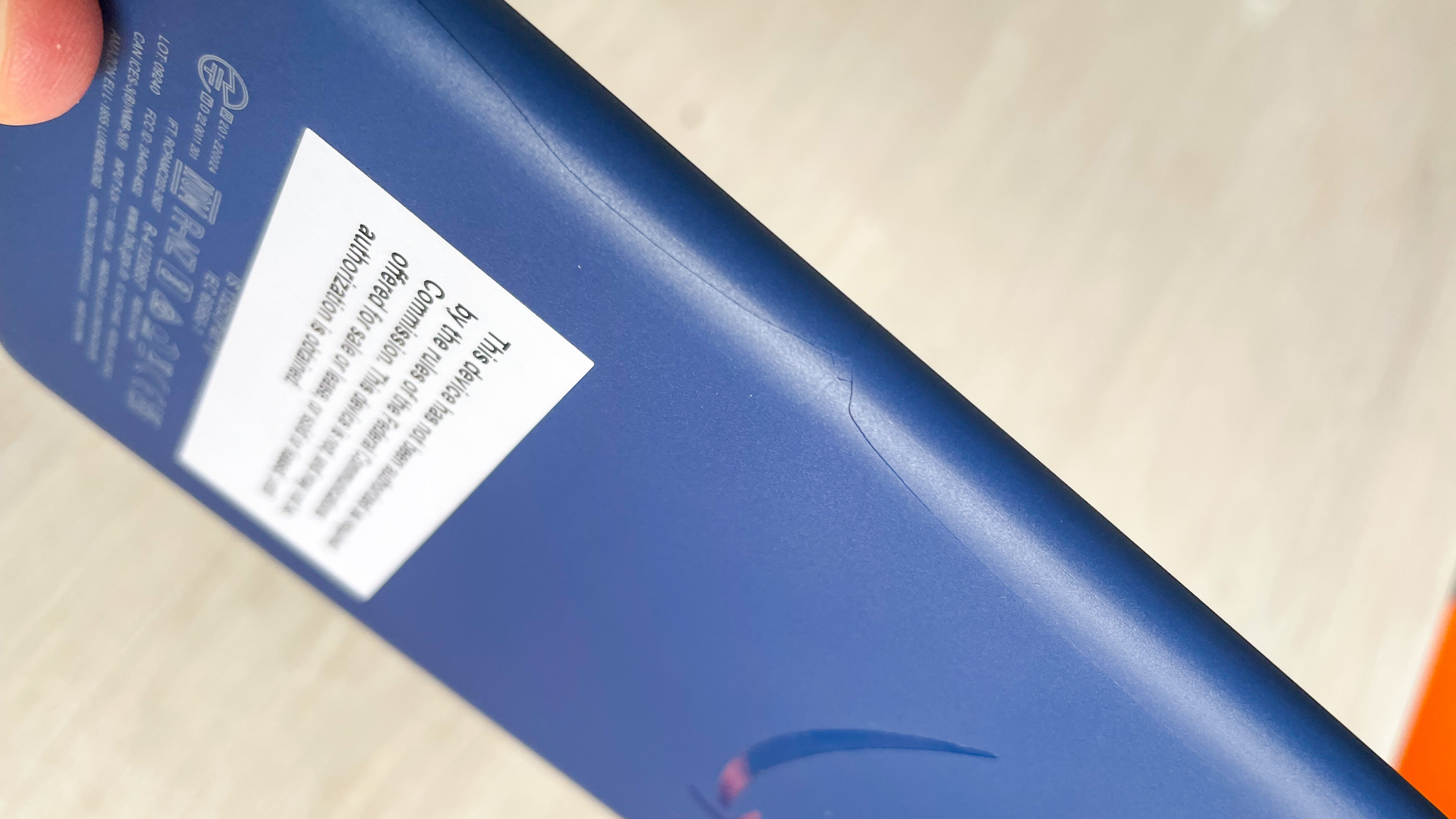
While Amazon is tight-lipped about which screen is being used on the 2024 Kindle, I compared it to its Kobo competition and the 2024 Kindle Paperwhite – there’s a visible difference in contrast that makes text appear darker, sharper and clearer. That’s not to say reading on the entry-level Kindle is bad, far from it. The 6-inch screen still gives you a lovely 300ppi resolution and text looks great… it’s just that there’s something ever so slightly better out there for about the same cost.
Amazon claims that there’s 25% more screen brightness on the 2024 Kindle, and that’s definitely true, although I suspect it’s not because of a screen upgrade, but rather the addition of an extra LED. Again, the number of LEDs being used for a Kindle’s frontlight is something I can’t remember Amazon having ever revealed, so I can’t give you an exact number, but it’s an improvement I don’t think was necessary. I doubt there are too many users who will want to set their ereaders at maximum brightness. I usually have my Kindles set at brightness level 5, which is perfect for nighttime reading without straining the eyes, and you usually don’t even need a screen light in bright sunshine. I did try the maximum brightness setting on the device (which is level 24) and found it hurts my eyes on a cloudy day. It’s not too bad in bright sunshine when everything else around you is well-lit too, but it’s physically painful for me in a dimly lit room. That said, I’m sure there will be the rare reader who appreciates the extra brightness.
Another thing to note about the Kindle’s frontlight is that there are no amber LEDs here, so you won’t be able to adjust the light temperature to warmer tones for evening or nighttime reading (something you can do on the Kobo Clara BW). However, there is a dark mode that you can use to further reduce the effects of white light on your eyes.
• Design & display score: 4 / 5
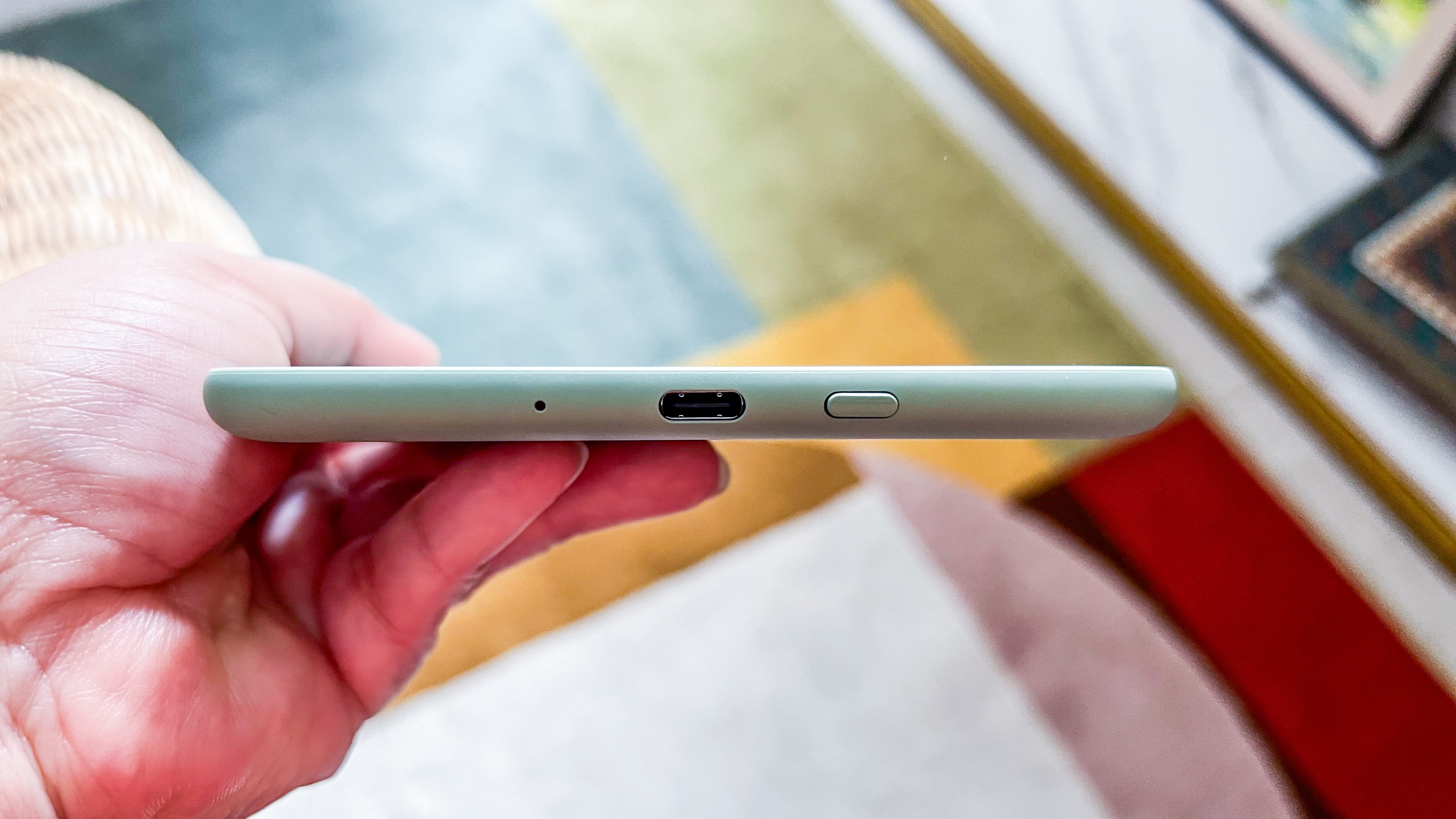
Amazon Kindle (2024) review: User interface
- Easy-to-use interface
- Can feel cluttered to some users new to the Amazon ecosystem
- Native EPUB support, but still requires extra steps to load files
I’ve been a very strong proponent for simple ereader interfaces – after all, these are devices designed for the main purpose of reading, so anyone should be able to use them. Amazon nails this for the most part, with the Kindle OS quite easy to navigate and find what you need.
In fact, the entire setup process is simple – you just need to follow the on-screen instructions and choose the right options. In my case, I just had to sign in with my Amazon account (which is a paid Prime subscription) and my existing library – which at this point is still in the cloud – is displayed. Any of the books I want from there, I just have to tap and they download to the device.
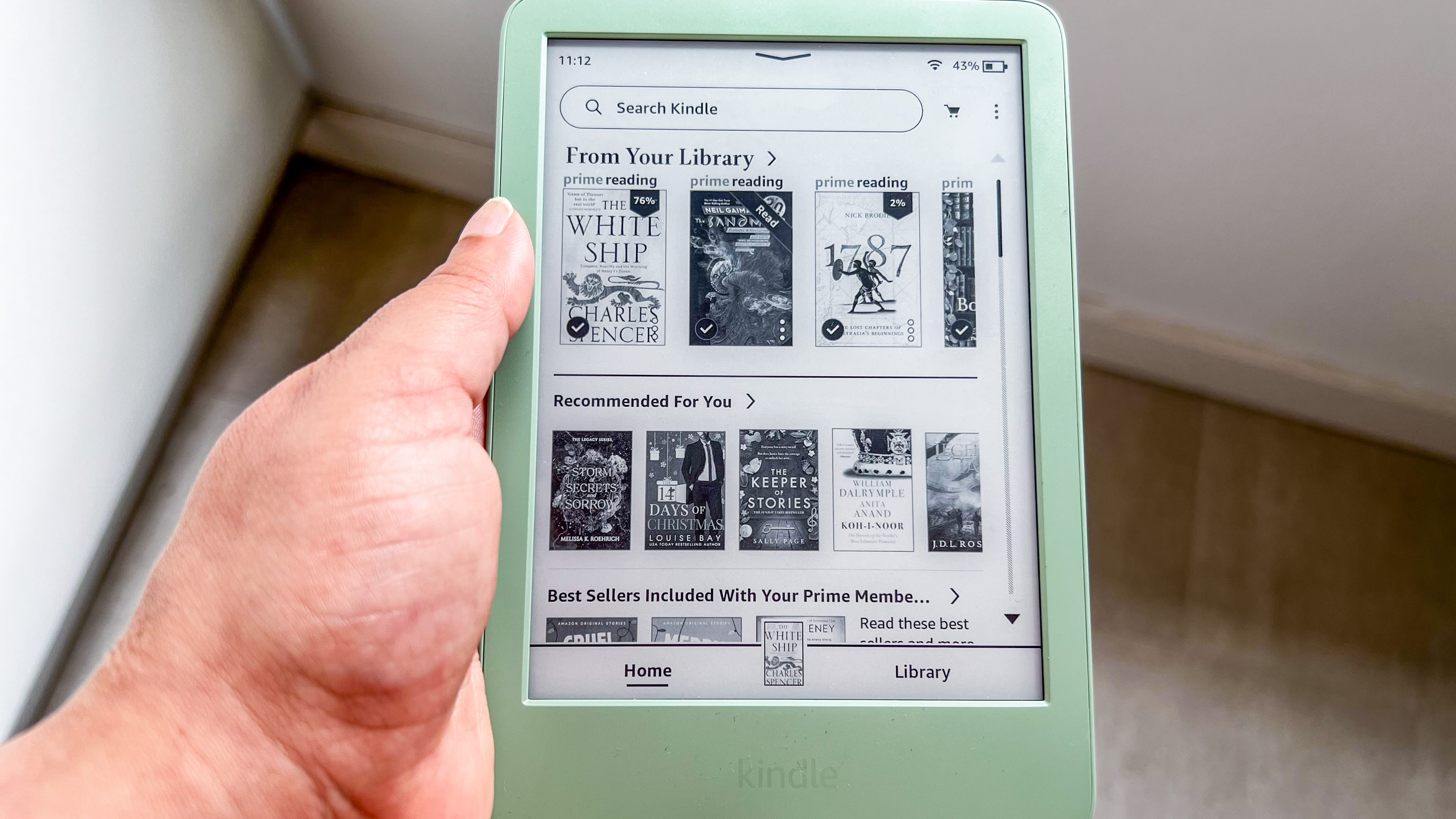
While I love the Library tab of the Kindle, I’m not a huge fan of the Home screen – I find it excessively cluttered with too many recommendation options. It feels like I’m being forced into entering the Kindle Store every time I go to the Home screen. In comparison, Kobo’s Home screen is a little less recommendation heavy and, in my opinion, looks a little cleaner.
I wish there was a way to make the Library tab the default Home screen (something you will find on some Onyx Boox ereaders running an Android OS), but there’s no option for that in the Settings. However, if you set the Kindle to sleep mode with the Library pane open, that’s what will show when you wake it up again. Or, if you have a book open, it will wake up to the page you left off at, so you really don’t need to interact with the Home screen unless you need to access the Kindle Store to find your next read.
Settings are accessed by swiping downward from the top of the screen, where the screen brightness slider and dark mode button also sit. What I really appreciate about the Settings options is that it’s not overkill like I’ve seen on Boox devices – a handful of useful options that are easy to understand is exactly how it should be. I love the fact that I can remove practically all page furniture from a book, leaving me a clean display with just the text or comic frame I’m reading.
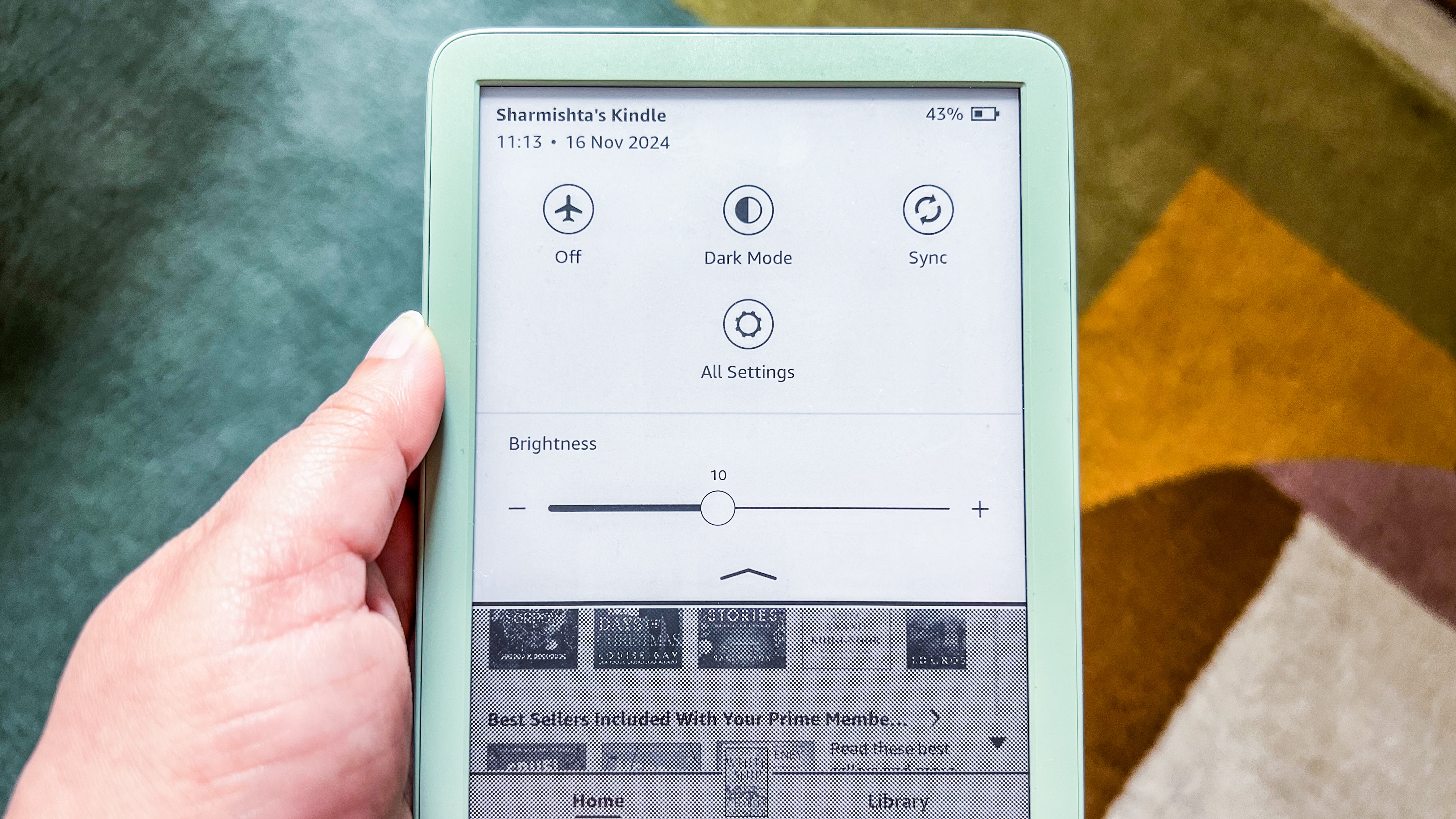
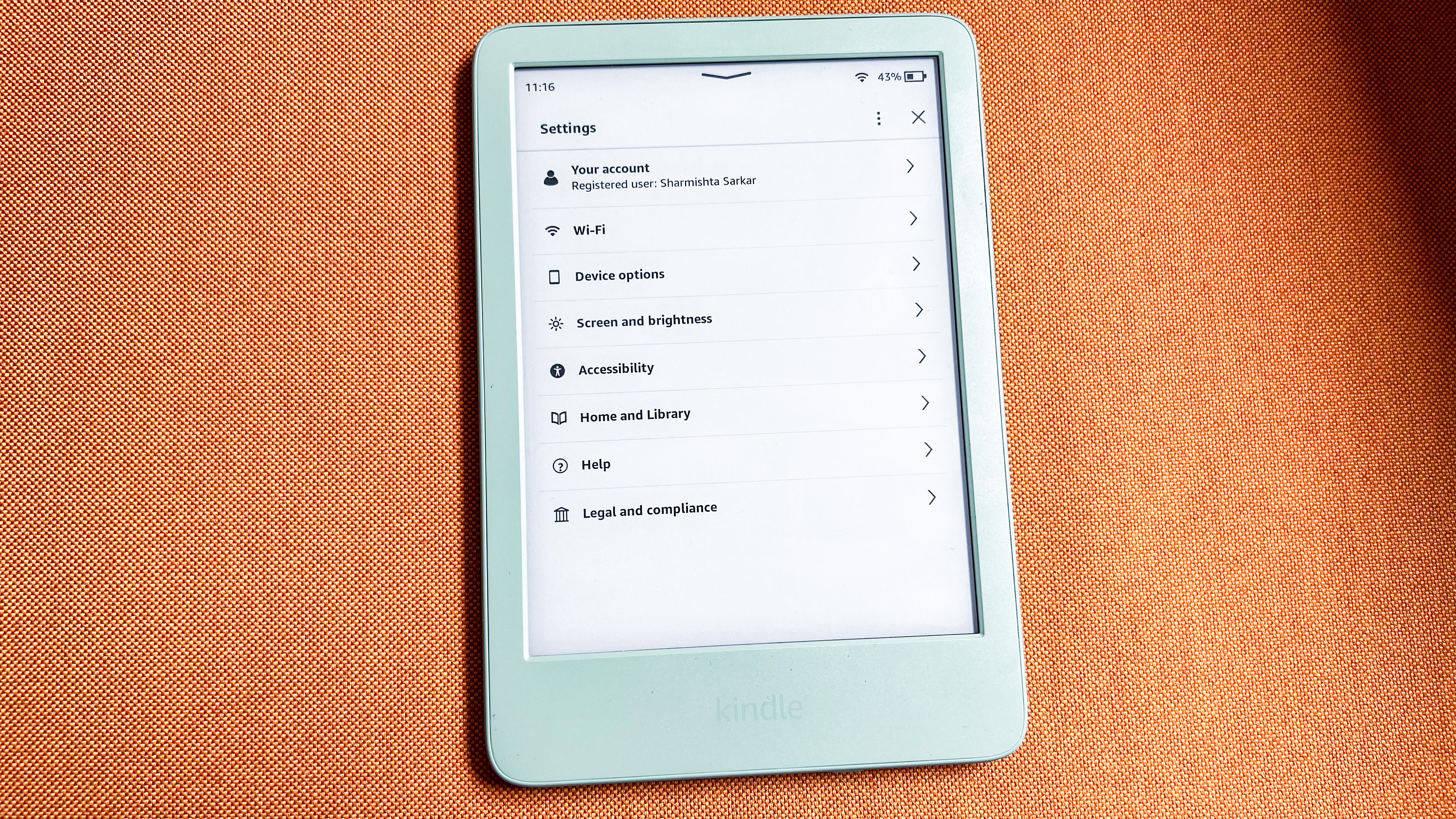
Speaking of comics, all Kindles have a frame view that is fantastic, even on a small ereader like the entry-level Kindle. Open the comic or graphic novel of your choice, double tap on the page and each frame will open separately so you can read the speech bubbles comfortably. Without this feature, speech bubbles would be nigh impossible to read on a full-page view as they’d be too small on a 6-inch screen.
Gone are the days of Amazon's dislike of the EPUB file, the most common ebook format there is. With MOBI nearly dead now, there is native EPUB support on the Kindles, but you still have to jump through hoops to sideload them. You can either send them via email using the Kindle address you get set up with when you first start using the ereader, or you can use the Send To Kindle desktop app. Both have file size caveats, though, but you can also always use software like Caliber to convert EPUBs to AZW/AZW3 formats, which are Amazon’s proprietary files.
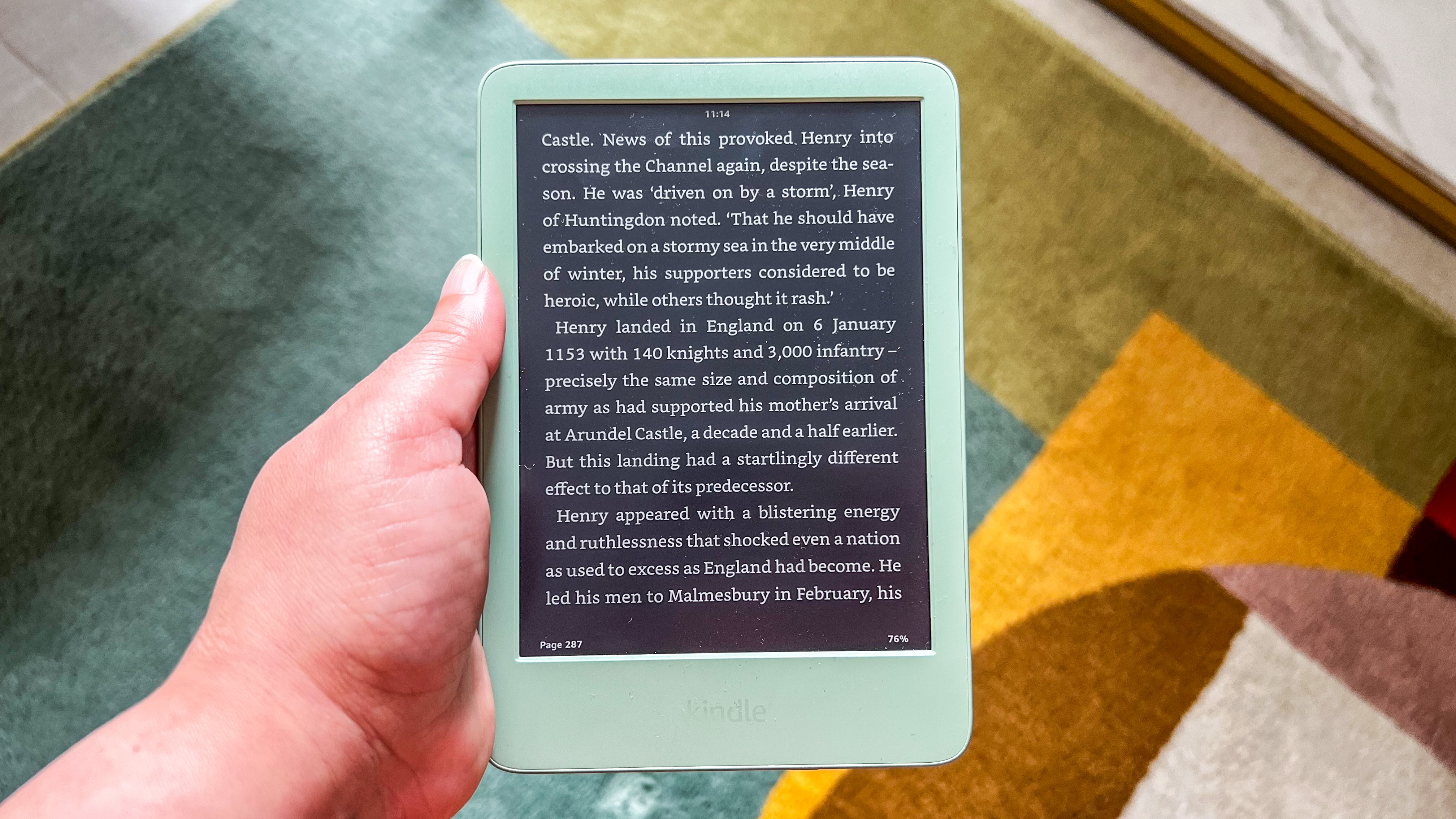
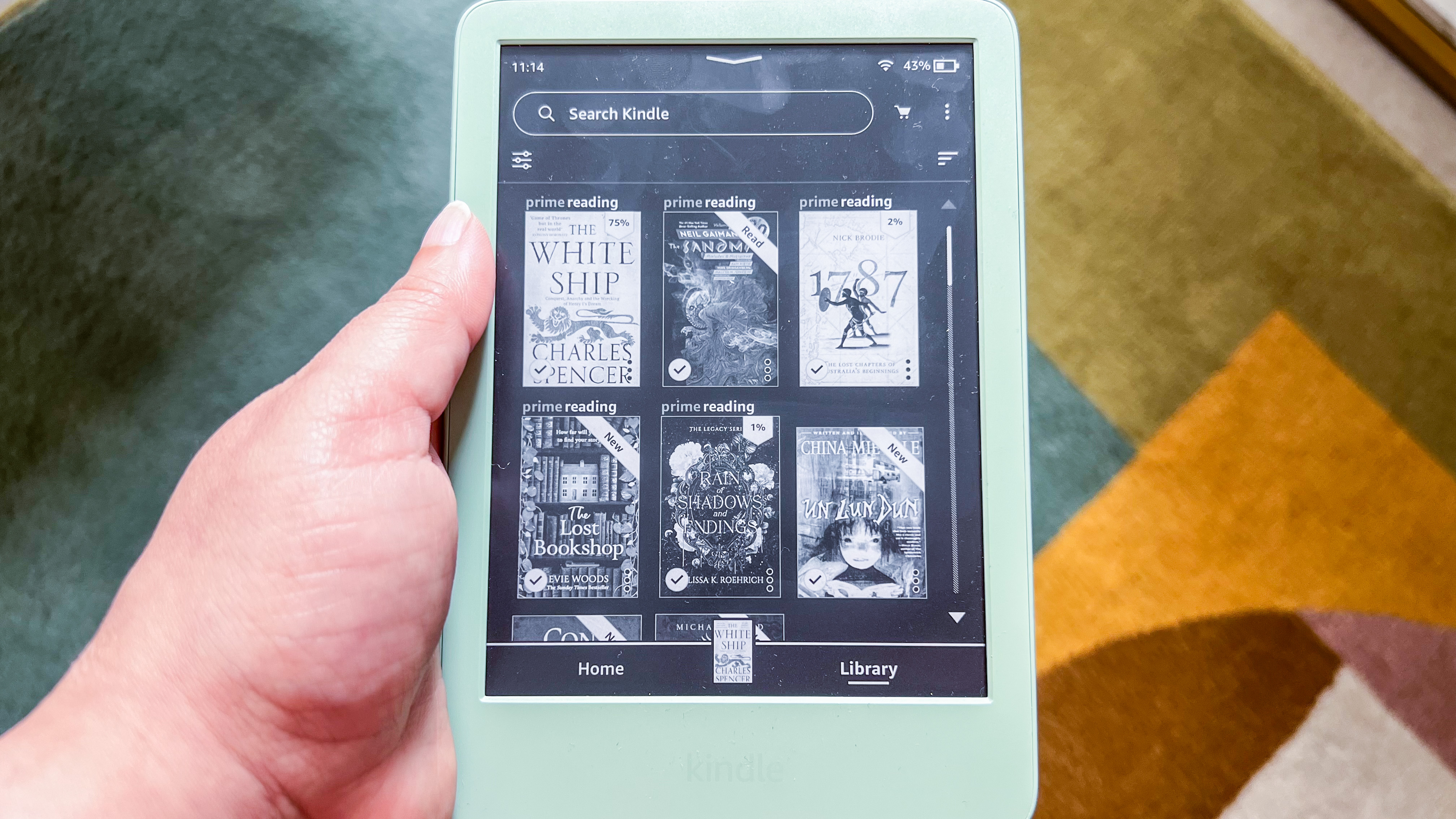
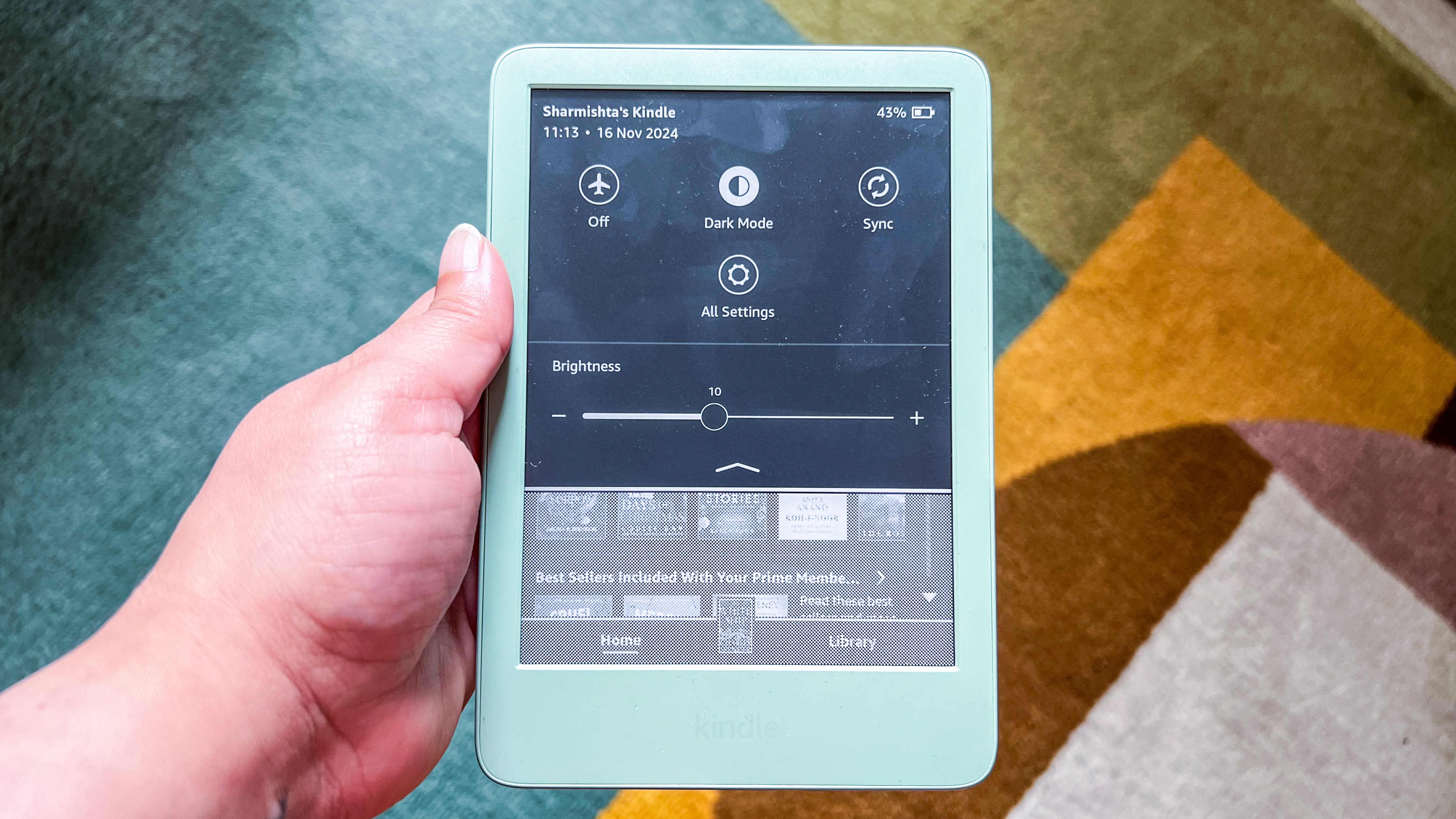
You can listen to Audible audiobooks if you have a subscription, but you will need to pair a set of Bluetooth headphones to the Kindle first. The pairing, I found, needs a few tries, but once connected, you can listen to the stories rather than read. With Whispersync turned on in Device Options, you can stop reading at a page and, if you also have the audiobook version, the narration will start on that page. It will even sync to your Echo device if you have one.
While you can connect to a Goodreads account if you use it, there are no other third-party options available for either cloud sync or borrowing library books, While readers in the US can use a Kindle to borrow from a local public library, it’s a limited feature that’s not available elsewhere, which makes a Kobo a compelling alternative if you don’t want to spend money on book purchases or subscriptions.
• User interface score: 4 / 5
Amazon Kindle (2024) review: Performance
- Slightly faster page turns and overall performance
- Lacks contrast compared to the competition
- Decent battery life, depending on brightness setting
Performance measurement for an ereader is simple, really – you determine how well the tap (or swipe) to turn functionality works and if there’s any ghosting (or overlay of previous page) on the screen, something that’s been very common with ereaders for years.
On both counts, the 2024 Kindle excels. In fact, I think the overall performance is a wee bit faster on the new model over its predecessor. While I’d love to say that’s because of a new processor, I don’t have that knowledge, but it could be software tweaks that have improved performance. Again, this is just a theory I have based on how large that OS is on the 2024 Kindle, so don’t quote me on that.
Whatever the reason, page turns are snappy and not once did I have any overlay while reading or typing via the on-screen keyboard. The latter also feels quite responsive – entering my WI-Fi password at setup and typing out my Amazon credentials happened with barely any lag. So while I might say that this doesn’t feel like an ‘upgrade’, I appreciate whatever Amazon has done to improve performance over what was already a pretty good budget ereader.
I also appreciate that downloading books from the Kindle Store is also very speedy compared to what I’ve experienced when sourcing titles from the Kobo Store on a Kobo ereader.
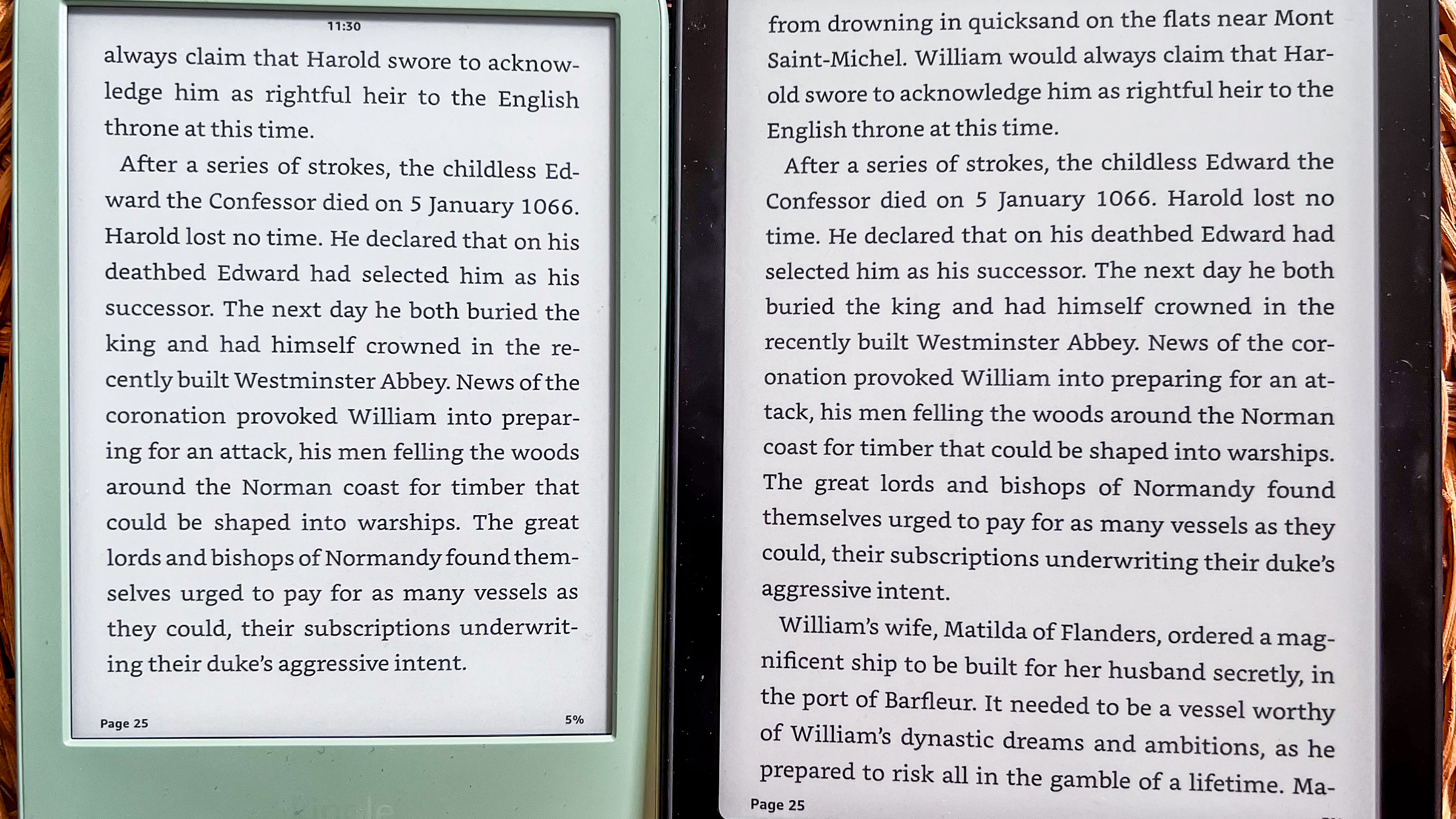
Battery life remains the same as before, with Amazon saying you’ll get up to 6 weeks of use on a single charge, although I think it’s more like 4 weeks. That, though, will depend on how bright you like your screen set at.
On my Kindle, I had the brightness set to 5 at all times and page refresh set to each page turn and saw an average drop of 2% per hour of reading. That increases to about a 3% to 4% drop each hour with Kindle Store browsing thrown in as well. With the brightness level set at 24, which is maximum, I found battery levels drop by an average of 7% per hour. So, depending on brightness settings and how long you read per day, I’d say you’ll get a top of 4 weeks between charges and that’s still pretty good.
Using a 65W wall charger and a good quality USB-A to C cable, the 2024 Kindle took 1 hour 52 minutes to go from 9% to full, which is average for an ereader. I haven’t had the opportunity to try charging it via a USB-C to C cable yet, but that might speed things up a touch, as long as you’re still plugged into the wall socket and not using your computer or dock.
• Performance score: 4.5 / 5
Should I buy the Amazon Kindle (2024)?
Buy it if...
Don't buy it if...
Also consider
How I tested the Amazon Kindle (2024)
- Used as main reading device for one week
- Viewed both graphic novels and regular books
- Checked performance at various settings
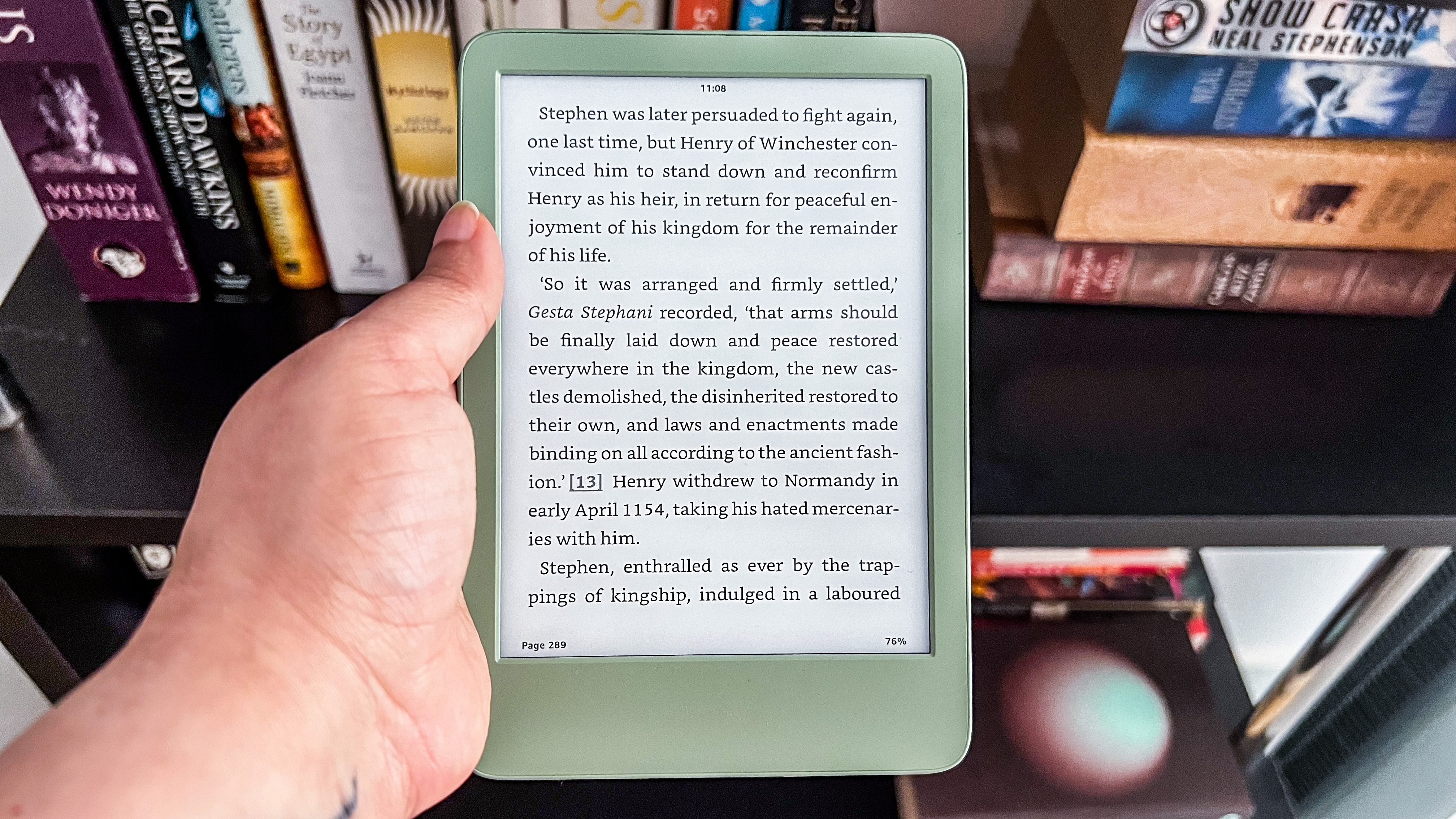
I didn’t have the 2024 Kindle with me for too long before first publication, but I made sure I spent as much time as I could reading on it. Over the course of 7 days, I read an average 4 hours per day on it, reading history and fantasy novels, as well as my favourite The Sandman graphic novel.
These were already available in my Kindle library, so I only needed to sign into my Amazon account, then sync to the device via the cloud. I didn’t sideload any new titles to the 2024 Kindle though.
While I don’t have a Kindle Unlimited or Audible account, I used the free trial of the former to find some titles to read, but mostly used my Prime Reading subscription to borrow some books. I found one audiobook available on Kindle Unlimited to try pairing a set of wireless earphones to test audiobook functionality, although I’m not much of a listener.
I also repeatedly changed light settings to see how the battery held up, and did direct screen comparisons with the Kobo Clara BW and the 2024 Kindle Paperwhite.
Read more about how we test
[First reviewed November 2024]







